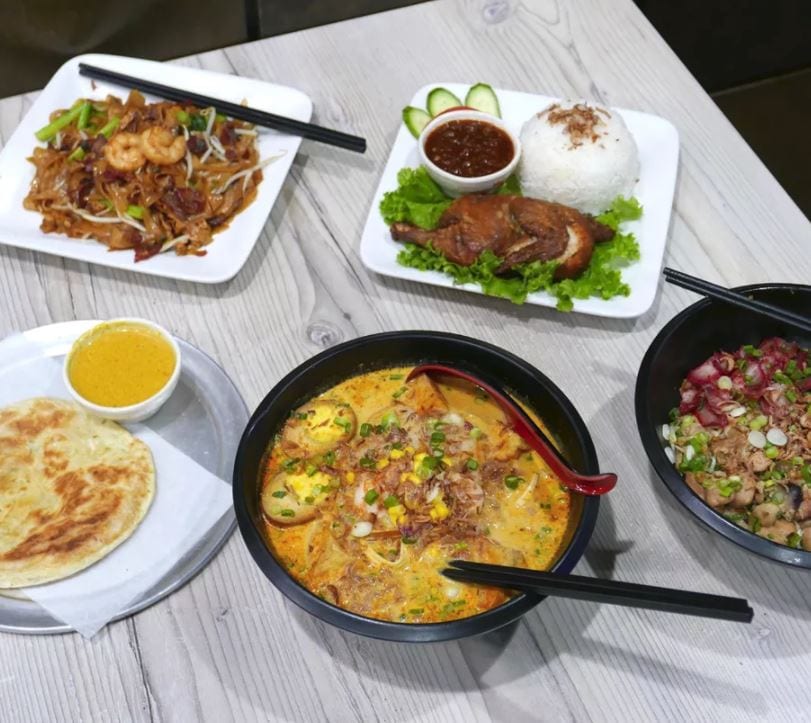EATER LA
Indonesia has about as many people as the Philippines, Thailand, and Vietnam combined, over a quarter-billion, but those last three countries have gained significantly more influence on LA’s culinary landscape. Of course local demographics play a role, but we’ve recently witnessed the rise of a new spate of casual Indonesian-inspired restaurants like Mr. Sate in Palms and Rinjani in Glendale.
Now Angelenos are discovering this boldly flavored food beyond Indonesian hotbeds like Walnut and West Covina. The best new addition just may be Uncle Fung Borneo Eatery, a warm and welcoming Indonesian restaurant that spun out of Alhambra and is now vying for diners in Long Beach, a city far better known for Cambodian food.
This restaurant doesn’t really specialize in regional Indonesian dishes, but does point to a more modern approach to international cuisine in an increasingly vital LA sub-market, kind of like what Daw Yee did when translating their concept from the SGV to Silver Lake.
After a decade of running Borneo Kalimantan Cuisine in Alhambra, Peter Then (aka Uncle Fung) expanded to Long Beach Beach’s Bixby Village Plaza in September.
Uncle Fung, a riff on his Afung surname, grew up on the Kalimantan side of Borneo, Asia’s largest island and part of Indonesia’s archipelago. Borneo has been subject to Dutch and British colonization over the years. Now, the island’s northern quarter belongs to Malaysia and the tiny, but wealthy nation of Brunei. Five Kalimantan provinces occupy remaining real estate in the south and fall under Indonesia’s purview.
The casual, full-service restaurant features a tight 15-item menu of specialties from Singapore, Malaysia, and Indonesia. Anyone who’s been to hawker centers in this part of the world will recognize many of these plates, and Uncle Fung deftly plays the hits.
The noodles are especially good. Uncle Fung offers three different takes on laksa mee ($9.99), a spicy curry noodle soup that’s based in a rich, spicy broth crafted with shrimp stock and coconut milk that’s popular in the region. The key difference between these laksas is the noodles. Try it with the “curly and elastic” Alhambra-made egg noodles that are reminiscent of crimped noodles one might in ramen. Vermicelli and rice noodles are also available, though they don’t contribute the same kind of bounce.
In all cases, laksa’s littered with puffy fried tofu triangles, firm tofu strips, sweet shrimp, chewy fish cakes, and soy-marinated hard-boiled egg. A sprinkling of corn kernels, bean sprouts, scallions, and fried shallots contribute sweetness and crunch.
The primary difference between Malaysian, Borneo, and Indo mee are the toppings. Start with Borneo hokkian mee ($7.99), topped with sweet, thin-shaved BBQ pork, soy-braised dark meat chicken, and mushrooms. Yes, that’s another blanket of fried shallots, scallions, and bean sprouts. Deal with it. This bowl comes with a chicken broth sidecar.
Fried rice and noodles are representative of the “Borneo wok,” which imparts a smoky sear. In the case of char kway teow ($9.99), thin, stir-fried rice noodles are tossed with BBQ pork, shrimp, fish cakes, scrambled egg, greens, bean sprouts, and scallions. These noodles are fairly straight-forward. As is often the case in life, hot sauce helps.
Uncle Fung makes a punchy hot sauce with Thai bird’s eye chilies, sugar, garlic, and ginger, and of course salt and pepper. The manager also tipped me off to a “secret stash” of hot sauce in back for staff that’s “20 times hotter and thicker.”
Ayam penyet ($8.99), well-spiced Indonesian fried chicken, is listed on the menu as “hearty, chewy fry, halfway to crunchy jerky.” That doesn’t mean the Cornish game hen is dry — far from it. The burnished bird is seasoned with turmeric, garlic, ginger, salt, and pepper before being judiciously fried, then served with steamed white rice dome topped with crispy shallots. Sambal penyet, a thick red chile paste with more sugar and seeds than their house hot sauce, is just the thing to add more punch, other than the “secret stash.”
Roti prata (one piece for $3.99 or a pair for $7.50) is a flaky fried pancake that’s griddled and comes with a mildly spicy Indonesian island curry designed for dipping. Be sure to eat before the pancakes cool and the flakes dissipate.
The remaining menu (such as it is) involves gado gado, a tofu, egg and vegetable salad slathered with peanut sauce; and sate ayam, grilled dark meat chicken skewers.
To drink, tropical fruit tea, coffee (sweet and creamy), and milo (chocolate drink similar to Ovaltine) are supposedly typical of Borneo, but hardly essential.
Uncle Fung is just getting started. He recently took over a second Nam Vietnamese Eatery in Buena Park and will open a third Indonesian restaurant (likely with more street food) to start 2018. He appears to be part of a burgeoning Indonesian food movement that’s taking hold across LA.
Uncle Fung Borneo Eatery, 5716-A E. 6th St., Long Beach, 562.494.3888

